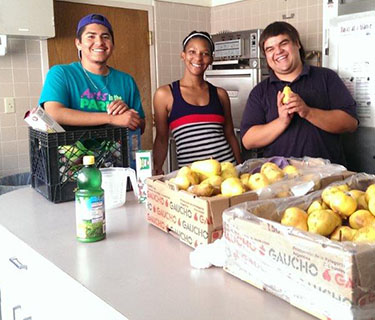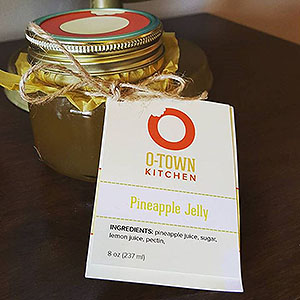WSU Goddard School Student Starts Canning Kitchen to Help Homeless
OGDEN, Utah – Isaac Farley knows what it’s like to be homeless. He’s been there. He remembers watching his mother and siblings struggle. He remembers the help his family received from kind strangers. Now that Farley is in a position to do something about homelessness in Ogden, he is. An entrepreneurship minor at Weber State University, Farley created O-Town Kitchen, a nonprofit organization that employs homeless parents to make and sell canned and baked goods.

Farley, right, with other O-Town Kitchen participants.
O-Town Kitchen collects food donations from retailers and restaurants — food that is near expiration, is in dented cans or is the wrong shape or color — and turns them into breads or jams and jellies with unique flavors such as pineapple, root beer, tomatillo and lime. The kitchen employs homeless parents from Ogden’s Your Community Connection (YCC) shelter to make the products, using processes approved by the Utah Department of Agriculture and Food.
“We are employing homeless people here in Ogden, and we are cutting down on food waste locally,” Farley said.
The preserves are sold at local farmer’s markets, where people are drawn in by samples and the unusual flavors.
“We’ve been amazingly well received. Ogden is a fantastic community, and I could never imagine doing this anywhere else,” Farley said, noting that he named the kitchen O-Town because he wanted it to be “100 percent about the Ogden community.”
While working on a research project for class, Farley found that homeless families are the fastest-growing part of the homeless population in Utah. According to Utah’s 2014 homeless report, about 46 percent of Utah’s homeless population consists of families. Many headed by single mothers or mothers with children fleeing domestic abuse, he said.
Unemployment is a major cause of continued homelessness, Farley explained, and O-Town Kitchen provides a way out. Participants learn to cook, package and market. They also gain valuable interpersonal skills from sales that will help them transition into more stable jobs.
“The most rewarding part is working with moms who are in tough situations, like my own family was,” Farley said. “I’m doing everything I can to help families who suffer under the same economic challenges that my family did.”
In its first three months of operation, O-Town Kitchen saved, redistributed or repurposed more than 500 pounds of food.
“On average, the U.S. wastes $161.6 billion of food per year,” Farley said. “One of my goals was to cut down on food waste.”
Farley credits his success to the principles of building a sustainable business he learned in WSU’s Hall Global Entrepreneurship Center, in the John B. Goddard School of Business & Economics. He said he came up with the idea for O-Town Kitchen a long time ago but wouldn’t have pursued it without the help of his classmates, especially his friend Nestor Robles, who is the vice president of O-Town Kitchen.
Farley said Robles was indispensable in getting the project started, as was assistant professor Dave Noack, who is WSU’s Hall Endowed Chair in Entrepreneurship.
 Noack said the entrepreneurship program is set up to encourage real-world, hands-on experience. “Isaac and Nestor are two students who looked beyond a grade,” Noack said. “They identified a true opportunity and need in the community and put in hours of work outside of the classroom to achieve something meaningful.”
Noack said the entrepreneurship program is set up to encourage real-world, hands-on experience. “Isaac and Nestor are two students who looked beyond a grade,” Noack said. “They identified a true opportunity and need in the community and put in hours of work outside of the classroom to achieve something meaningful.”
To students thinking about starting their own businesses or nonprofit organizations, Farley advised doing the homework and defining a problem. Then, he said, let the problem dictate the solution. One of the most important things Farley learned was not to be too married to his first idea, but he developed ideas to respond to what customers wanted. Cultivating that sense of flexibility is a critical skill entrepreneurs need to grasp before starting out on their adventures. “Isaac is a remarkable person,” said Jeff Steagall, the dean of the Goddard School. “He’s taken a challenge from his own life, analyzed two social problems that needed solutions, and combined them with his entrepreneurial knowledge to make a real difference in our community.”
To Farley, the spiritual side of his project is as important as the business.
“God takes people who are broken and that the world says has no value, and gives them a new life and new value,” he said. “That is exactly what we are doing at O-Town Kitchen. The entire project is about cutting down on waste — wasted food and wasted human potential. We are about second chances and repurposing.”
Farley hopes to pursue more ventures in the future. He said he would prefer trying to solve problems instead of complaining about them.
“I want people to feel motivated to make a difference here, in their own backyard,” Farley said. “We don’t have to sit idly by and let the problems that are here keep going. We can make a difference.”
O-Town Kitchen products will be available through the end of September at the Ogden Farmer’s Market. The O-Town booth will finish the open-air market season at Motor-Vu flea market in Riverdale. Farley plans to move to online sales in November. Food and supply donations may be taken to the YCC in Ogden every Monday from 2-5 p.m. Monetary donations can be made online.
Learn more about O-Town Kitchen at otownkitchen.org.
For more information about WSU’s entrepreneurship center, visit weber.edu/goddard/Hall_Global_Entrepreneurship.html.
Visit weber.edu/wsutoday for more news about Weber State University.
For high-resolution photos, please visit the following links:
wsuucomm.smugmug.com/Press-Release-Photos/2015-photos/September-2015/i-CkWPq9w/0/X2/2-X2.jpg
Ivonne Dabb, Office of Marketing & Communications
801-626-7439 • ivonnedabb@weber.edu- Contact:
Isaac Farley, O-Town Kitchen founder
801-675-2798 • isaacfarley26@gmail.com